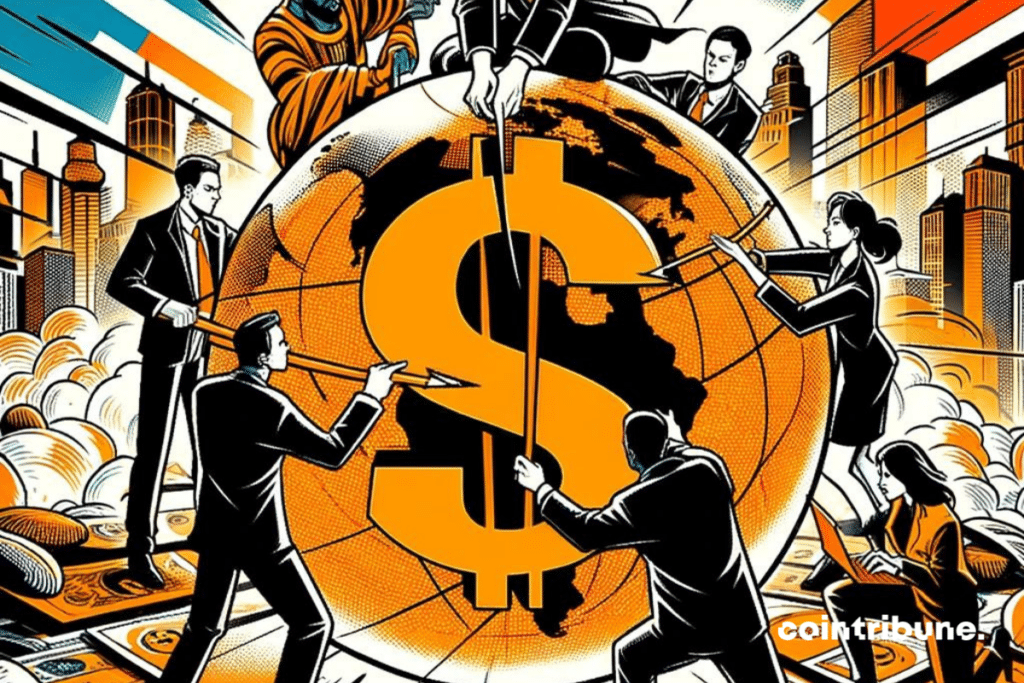3 U.S. Sectors To Be Affected If BRICS Ditches the Dollarhttps://t.co/1rDleVoblc
— John Morgan (@johnmorganFL) March 31, 2024
A
A
De-dollarization advocated by BRICS: A threat to three key sectors of the United States
Mon 01 Apr 2024 ▪
4
min read ▪ by
Getting informed
▪
Payment
Summarize this article with:
The BRICS plan to move away from reliance on the US dollar will significantly affect the United States. An effect that, according to analysts, will impact three vital sectors of the American economy, namely banking and finance, technology, and trade. Not to mention the consequences that a debt crisis would trigger.

A BRICS Plan That Will Harm the U.S. Economy
The United States has literally no interest in seeing the BRICS dedollarization plan succeed. Because if this ambition is realized, the American economy would suffer greatly, especially in three strategic sectors.
Firstly, the banking and financial sector. Analysts estimate that a decrease in demand for US dollars in international transactions, as desired by the BRICS, would result in a slowdown in foreign exchange markets.
Consequently, banks and financial institutions that rely heavily on currency exchange activities would be affected. This could cause hyperinflation in the United States due to the repatriation of the greenback rejected by the BRICS and their allies.
Secondly, the abandonment of the dollar would exacerbate difficulties in the tech sector due to the inflation it would trigger. This outlook would compromise the competitiveness of American firms, which would then face high costs to maintain their activities.
Thirdly, the retail trade sector would likely see significant price increases for everyday consumer goods in the United States. A direct consequence of the surge in inflation linked to the devaluation of the American currency. The debt crisis could worsen the situation.
The Threat of a Debt Crisis on the American Economy
Beyond dedollarization, the American debt crisis appears to be a very significant threat to the U.S. economy on its own. The situation is such that Larry Fink, CEO of BlackRock, recently sounded the alarm.
For him, the looming American debt crisis could spell the end of the U.S. dollar. As a reminder, the U.S. debt stands at 34 trillion dollars. This raises concerns, especially since the status of the dollar as the world’s reserve currency is being questioned.
Larry Fink highlighted that a heavily indebted America would struggle to combat inflation, which would exacerbate the already unbearable burden of debt. In this context, central banks are diversifying their holdings by moving away from the dollar in anticipation of a potential collapse.
The concerns of BlackRock’s CEO are also echoed by other financial leaders. Notably Jamie Dimon, CEO of JP Morgan, who described the debt issue as the “most predictable crisis in history”.
With debt reaching unprecedented levels, the United States risks facing a catastrophe in the coming years. Therefore, it’s vital for them to try to block the BRICS project to move away from the dollar, which, it must be said, has momentum.
Maximize your Cointribune experience with our "Read to Earn" program! For every article you read, earn points and access exclusive rewards. Sign up now and start earning benefits.
A
A
Diplômé de Sciences Po Toulouse et titulaire d'une certification consultant blockchain délivrée par Alyra, j'ai rejoint l'aventure Cointribune en 2019. Convaincu du potentiel de la blockchain pour transformer de nombreux secteurs de l'économie, j'ai pris l'engagement de sensibiliser et d'informer le grand public sur cet écosystème en constante évolution. Mon objectif est de permettre à chacun de mieux comprendre la blockchain et de saisir les opportunités qu'elle offre. Je m'efforce chaque jour de fournir une analyse objective de l'actualité, de décrypter les tendances du marché, de relayer les dernières innovations technologiques et de mettre en perspective les enjeux économiques et sociétaux de cette révolution en marche.
DISCLAIMER
The views, thoughts, and opinions expressed in this article belong solely to the author, and should not be taken as investment advice. Do your own research before taking any investment decisions.